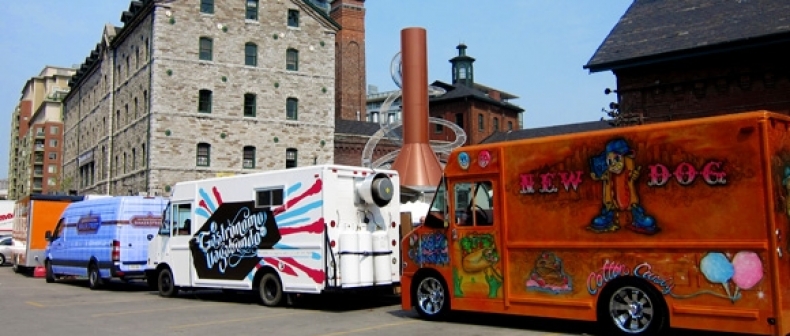
Credit: Jen Chan
When taco pop-up joint La Carnita set up shop in Toronto’s Brick Works for a taco and art event earlier this month, they were expecting 1500 people. Instead, over 3000 showed up, and La Carnita ended up serving over 2500 tacos to the rabid crowd.
Thanks to TV shows like the Food Network’s Eat St., spillover social media buzz from foodie hotspots like Los Angeles, and the organizing power of groups such as Ontario Food Trucks, street food has the attention of Torontonians. Whether food trucks and pop-up make good business sense is an entirely different matter.
If nothing else, the market is primed and ready—food has always been a hot property in Toronto. The near obsessive nature of online chatter dedicated to restaurant openings, new dishes, and food trends lends Toronto the aura of being a foodie city par excellence and the numbers back it up — 58,000 Torontonians are employed by the food industry, the second largest cluster in North America after L.A.
Street food offers a quick and dirty way to break into the food industry. Andrew Richmond, co-founder and head chef of La Carnita, works in design, but wanted to act on his passion for food.
He began by cooking at industry events in late June 2011 and word of mouth quickly spread. Though he began to formalize the process somewhat by using Foodshare for ingredients and borrowing his friend’s commercial kitchens, with only kitchen equipment and ingredients to consider he was able to keep costs low.
Food truck, while popular, require significantly more start-up capital. Adam Hynam-Smith, chef at the Toronto food truck that kicked off the current craze, El Gastrónomo Vagabundo, admitted that while overhead costs for a food truck might be cheaper, it’s really all relative.
“The best way to look at it, there’s no difference between a restaurant and a food truck, as a business,” said Smith. “We both serve food to people. We’re both a kitchen…the only thing that separate us are washroom and seating.”
The Cupcake Diner founder Natalie Ravoi found that food trucks can even be more expensive — it would have been cheaper for her to operate a storefront bakery, due to initial costs of outfitting a truck.
There’s also the small matter of not being able to sell alcohol, a part of the bricks and mortar restaurant biz that Smith calls “100% profit.” Food prices are also kept artificially low to satisfy the perception that street food should be fast, and cheap. While a patron might pay upwards of $20 for one of his dishes in a restaurant, he charges around $6, creating a situation where he said he has to “sell an absolute bucketload of food to make money back.”
Still, the opportunity to work corporate and private events make food trucks more of a potential moneymaker. Ravoi was astounded by the demand for her truck, and relieved to be able to count on moving a defined number of product (as many as 2000 cupcakes in four hours). When on the road, food trucks also have the ability to flit between the best locations or find strength in numbers—events such as Toronto Food Truck Eats have been met with long lines and plenty of online buzz.
While the pick-up-and-go nature of the food truck business works well in cities such as Hamilton, operating in Toronto is less of a free and easy affair. Current by-laws and licensing restrictions make finding a place to park a hassle, though renewed political will to cut the red tape might soon make this a non-issue.
Hopping between cities is also not such an easy matter. Food trucks need separate licenses to operate in each city — up to $1030.25 per year in Toronto, plus $352.52 for every member of staff.
Where food trucks do have an advantage is in the area of the oh-so-important public health inspections. According to Mark Macdonald, the co-founder of Toronto Food Trucks, food trucks have an easier time passing health inspections due to their small size, and because of lack of storage, ingredients tend to be fresh.
For those who are able to balance out the drawbacks, operating a pop-up or food truck biz can make for a much more seamless transition to bricks and mortar, as La Carnita’s Richmond is set to do on College Street in June. Richmond creds his pop up experience with being able to test his taqueria concept, and building his reputation, before making a major financial investment.
With Dallas, Texas going from six food trucks to over 50 in the past year, it just might be Toronto’s turn to capitalize on the street food craze.
“It’s certainly not a get-rich-quick type of a business,” Macdonald cautioned. “It’s one [where] you need to be committed and have a passion for food to make happen.”
____
This is Bronwyn Kienapple’s first piece for Toronto Standard. Follow her on Twitter @B_Kienapple
For more, follow us on Twitter @TorontoStandard and subscribe to our newsletter.














